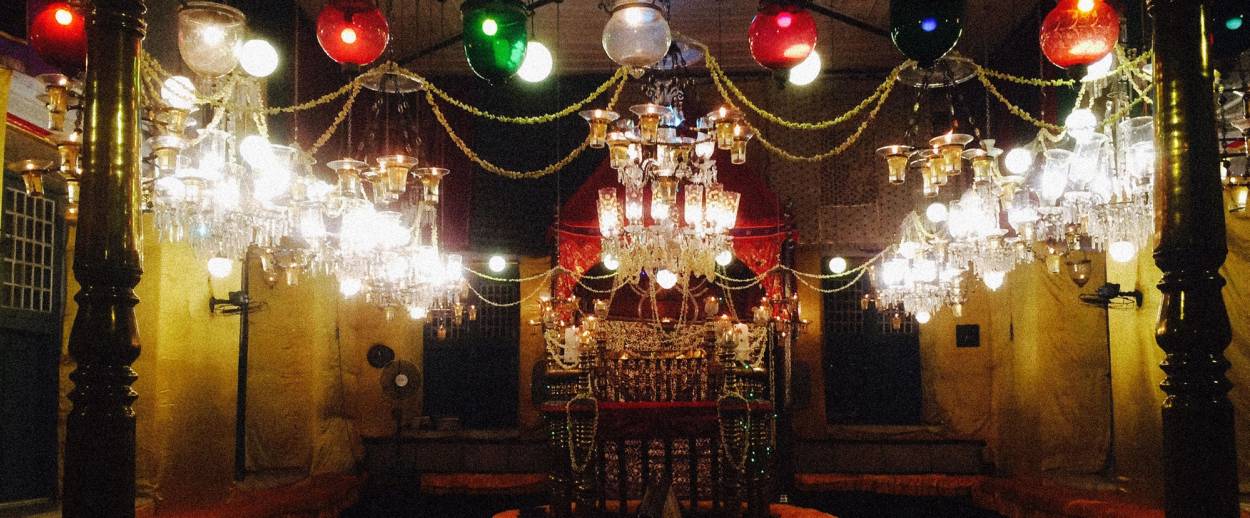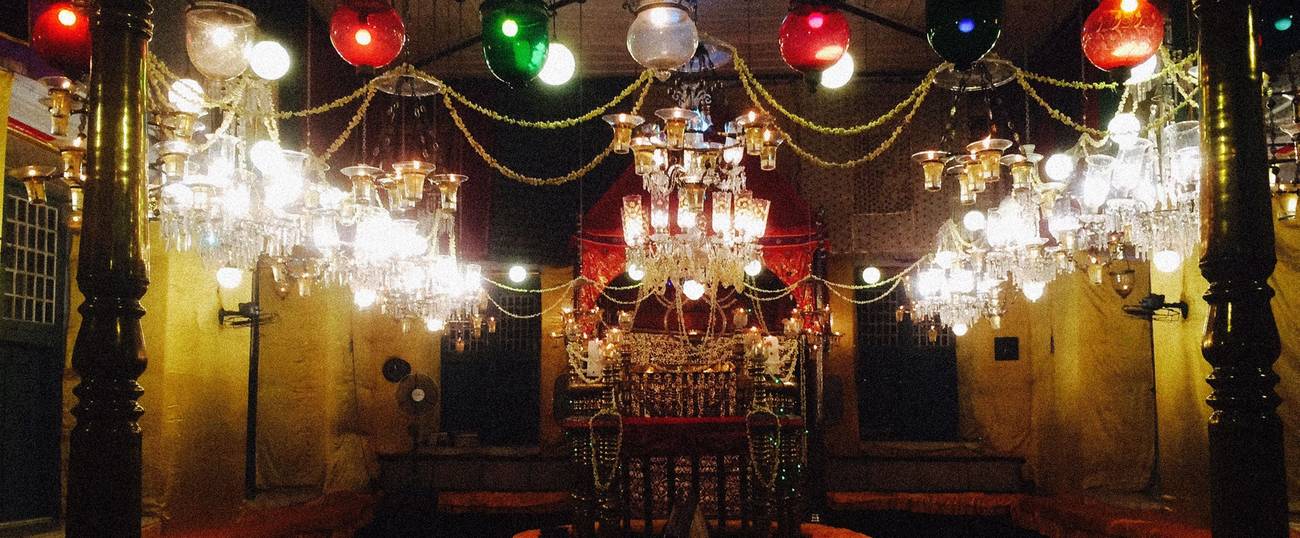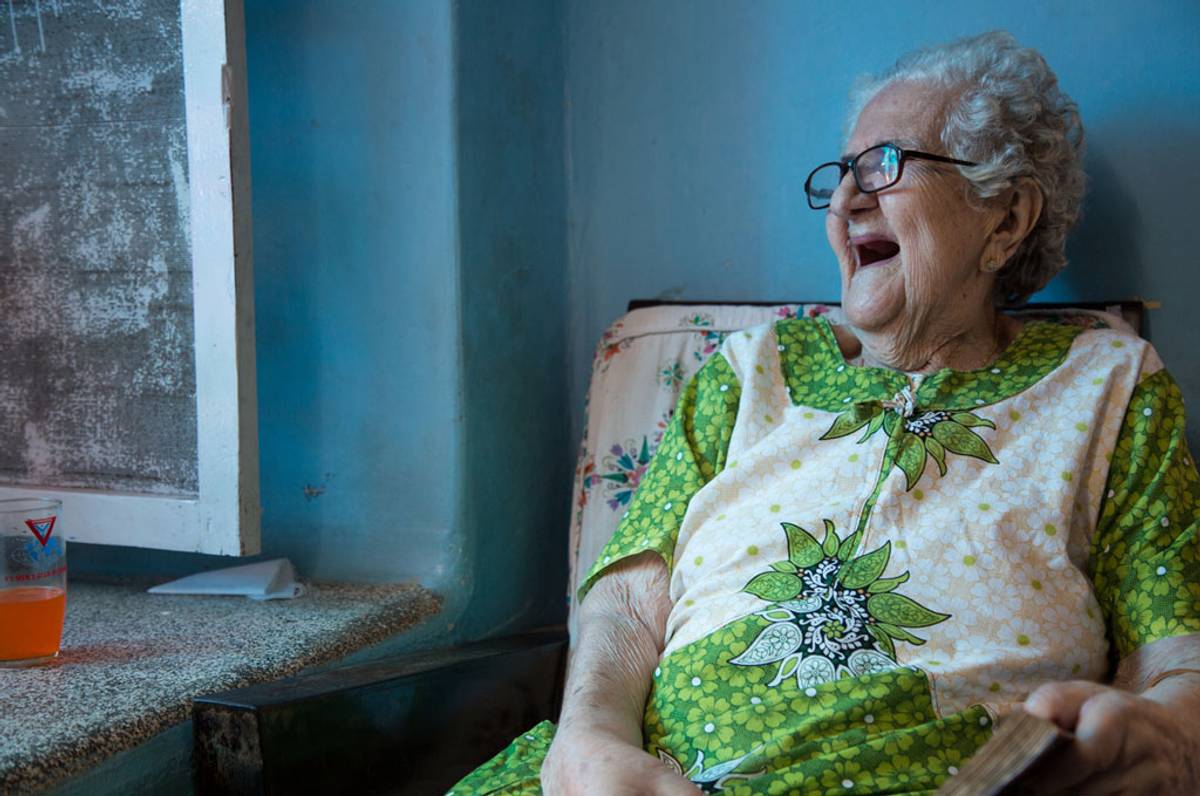Pillars of the Community
As Jews leave Cochin, Muslim neighbors and friends tend to what remains of their heritage in India




Sarah Cohen, 93, walked down Synagogue Lane in Jew Town at dusk in early October. She teetered with fragility and palpable excitement as she made her way through this neighborhood in the city of Cochin in the region of Kerala, on the southwestern coast of India. There was rumored to be a minyan for Simchat Torah. That—a minyan—is a rarity in this dying Jewish community of six, whose average age is 72. She wore a magenta-and-olive “Kerala nightie”—what we might call a muumuu—that her aides Jasmine and Seli dressed her in, and a shimmering pink headscarf. It’s a nod to the Jewish Cochin tradition to wear all red on this holiday. On her right was Thaha Ibrahim, age 45, who gripped her arm proudly and smiled. On her left was Ibrahim’s wife Jasmine, 43, who held Sarah up to help her walk to Pardesi Synagogue, the 450-year-old house of worship that historically catered to the Pardesi—or “white”—Jews, a term coined by the Portuguese settlers in India in the 16th century.
Thaha Ibrahim is Muslim, and in Cochin such friendships between Jews and Muslims are what keep the tiny Jewish community afloat. In addition to the six remaining Pardesi Jews, there are reputedly 29 Malabar—once called “black”—Jews across the city and surrounding areas. In the 1950s at the height of the community’s activity, there were eight synagogues in all of Kerala, a region roughly a quarter of the size of Florida, serving 2,500 people. Now there is but one functioning synagogue, the Pardesi, which welcomes Jews of all castes. The separation of Jews was parallel to and based on the Hindu caste system.
Except for a period from roughly 2010 to 2012, when a local Chabad rabbi was temporarily installed, the community has mostly functioned without clergy. Instead it’s led by elders or hazzans (cantors) who come from Mumbai or Israel to oversee holidays or funerals. It is one that has enjoyed distinct customs: two bimahs at every synagogue; a tradition of public singing by women; donning special colors for each Jewish holiday; and a celebration of Simchat Torah with grand lighting of towering candelabras—the decorations are called aalivelakku, named for a local ivy plant and are inspired by designs in Hindu temples and further embellished with Stars of David.
It’s not entirely clear when Jews first arrived in the region. According to members of the Pardesi Synagogue, it was 992 BCE, when Jewish traders from Judea visited the region. In 72 CE, Jews landed in the city of Cranganore (modern day Kogundallur) and stayed for good. Jewish ranks grew in subsequent centuries—notably in 1492, as a result of the Spanish Expulsion. According to Nathan Katz, a professor emeritus of religious studies at Florida International University, there is physical evidence of a Jewish presence from the ninth century and literary references to Jews date to the first century.
Though the region has been largely free of anti-Semitism, in recent decades Indian Jews have dispersed moving to Israel, Canada, Australia, and the United States. And as they’ve left, Muslims like Ibrahim have stepped in to make sure the community continues to shuffle along. He and his wife are among a handful of Muslims in Kerala passionate about preserving this unique heritage.
***
Ibrahim grew up watching his father, a tailor, interact with Sarah and her late husband, Jacob Cohen, a lawyer. His father helped stitch dresses for Sarah, whose primary hobby was embroidery (she opened an embroidery shop in 1986). Sarah made wedding dresses for the community and kippahs to give to visiting Jewish dignitaries. When he got older, Ibrahim started his own business selling postcards and other memorabilia, and Jacob, who had become a friend and mentor to Ibrahim, made space in the Cohen household for Ibrahim’s goods.
“Years later on his death bed, Jacob Uncle said, ‘My Sarah is alone and she doesn’t have any children, you have to take care of her like her son,’ ” Ibrahim explained. “I replied yes, I still keep my word and take care of her like my own mother. She is more than a mother to me even though I address her [as] ‘Sarah Auntie’ and I spend more of my time with Sarah Auntie than even my own family.” According to others in the community Sarah would no longer be alive were it not for the support of Ibrahim and Jasmine, who now run her shop for her.
I teasingly asked Ibrahim why he is so nice. “Because I am a Muslim, my religion taught me so,” he said.
So passionate is he about the Jews, that in 2013, he and his friend Thoufeek Zakriya, 26, produced Jews of Malabar, a documentary and a complementary exhibition that was shown in Jew Town in 2013. Zakriya is a prominent historian and calligrapher—self-taught and amateur—on the Jews of the region. He spends his time now mostly in Dubai, where he works as a chef. Like Ibrahim, he’s a Muslim, a devout one. Yet at age 16 he taught himself to read and write Hebrew. When he was a child, he asked his father to take him to Jew Town where a member of the Pardesi synagogue invited him inside. Still intrigued, he bought a book from a local book seller with a year’s worth of savings, not knowing it was a siddur until years later. Later Sarah Auntie gave Thoufeek a 140-year-old Hebrew Bible.

“We are brothers,” Zakriya told me, explaining his commitment to the Jewish community. He wrote the Hebrew script engraved on the tombstone of Joseph Hallegua, a late patriarch of the Pardesi Jews. This year, he donated a piece of art he made—an image of a hanukkiah caligraphed in both Hebrew and Arabic letters—to the NYC Muslim Jewish Solidarity Committee. “No boundary of religion stops you from being friendly or good to others. Religion teaches good things. War is caused by no contact, the distance that we keep, not allowing us to be close, that’s why we cannot love each other, if we understand each other we will love each other because we are brothers.”
“Sarah is my Jewish grandmother, and I am her Muslim grandson,” he went on, referring to Sarah Cohen. When Zakriya first moved in 2014 to Dubai, Sarah cried. On a visit to see her, I mentioned Thoufeek. She beamed with pride at his name.
Back with Ibrahim, I asked about the tensions that exist between Jews and Muslims elsewhere, in Israel, for instance, and if he or others are concerned such antagonisms could infect their enclave. He smiles. “We fight more with our families than those we don’t know,” he said. When I told him about the infighting I encountered amongs the Jewish community of Cochin itself, which cuts across Pardesi and Malabar to mostly old grudges, Ibrahim replied, “Jews have big brains, God has blessed them. We are more simple.” For Ibrahim and the Muslims of Cochin, the Jews are not an enemy. They are friends; they are family.
***
Hussein (who asked that his last name be withheld), 63, sells postcards near Sarah Auntie’s embroidery shop. For the past two years, he has also tended to the only operational Jewish cemetery in Cochin. There were a total of seven Jewish cemeteries; the other six are now mostly unrecognizable and overgrown. Hussein arrives each day around 6:00 in the morning, including before prayers on the Muslim prayer day of Friday, to prune the graveyard and assist the cemetery caretaker. He helps because the Jews asked him to. And because the Jews are his neighbors. As for wars going on in the rest of the world, here “we have peace,” he said. “This is India.”
***
Like this article? Sign up for our Daily Digest to get Tablet Magazine’s new content in your inbox each morning.
Alyssa Pinsker is a writer based globally. Follow her on Twitter @girl_goneglobal.